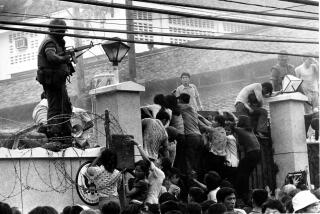Vietnamese Commemorate Decisive Battle
- Share via
DIEN BIEN PHU, Vietnam — Atop a tranquil, sunlit hill, the raw memories of battle amid red-earth trenches and barbed wire are still vivid for the elderly men who make the pilgrimage.
With their ramrod straight backs, mismatched uniforms and medal-pinned chests, Dien Bien Phu’s veterans are hard to miss. Hundreds have filed into this small border town in recent weeks to celebrate a long-ago victory, to mourn fallen comrades, but mostly to remember.
“I was in hell back then. Today feels like I’m in heaven,” Vu Van Nay, 77, said as he leaned heavily on a cane, his left sleeve empty.
This year marks the 50th anniversary of the battle of Dien Bien Phu, which ultimately ended France’s colonization of Indochina. It comes upon a nation of 80 million that still adheres to the communist ideals that propelled its war of liberation, but is steadily embracing the capitalist lifestyle.
The stunning victory of a peasant Vietnamese army over a military giant is remembered as a historic wake-up call and strategic masterpiece that is still studied by military historians.
“It was a defeat that reverberated around the world,” said Carlyle Thayer, a Vietnam expert at the Australian Defense Force Academy. “For Vietnam, it was electrifying on a global level. This was a major defeat for a colonial power at the hands of a Third World population.”
It wasn’t supposed to turn out that way. In this valley 260 miles northwest of Hanoi, ringed by mist-shrouded mountains, the French chose to make their stand, hoping to strangle supply routes from Laos and China to Ho Chi Minh’s ragtag army.
Commanded by Vo Nguyen Giap, the legendary military strategist, the peasant army had been inflicting significant damage. The French plan was to draw the Vietnamese into a conventional battle and crush them.
Instead, the French ended up trapped in the remote valley when the Vietnamese managed a near-impossible logistical feat of dragging disassembled heavy artillery over the mountainous terrain before beginning the 56-day siege that choked their enemy.
Col. Christian de Castries, the French commander, surrendered May 7, 1954, as the Vietnamese raised their flag above his bunker. It was the end of a colonial war and a triumph for communism that set the stage for the U.S. war in Indochina a decade later.
The human price was terrible: The French suffered more than 2,000 deaths in battle and countless others died during a forced prison march; the Vietnamese had at least three times as many deaths, plus tens of thousands wounded.
From the last hill captured by the Vietnamese during the fighting, there is a clear view of one of three war cemeteries below, its neat rows of gravestones and a marble wall of gold-printed names a silent testament to the heavy costs of yesteryear. Trenches and barbed wire have been left on the hill for tourists.
The town of Dien Bien Phu, now home to 70,000, sprawls out below, a patchwork of colorful blocks surrounded by emerald rice paddies. The main boulevard is named 7th of May. Over the decades, the bomb craters and trenches have been filled in and flattened into farmland.
This, too, is part of the veterans’ legacy. Once the battle was won, their jobs were just beginning. In 1958, Ho Chi Minh sent soldiers back to Dien Bien Phu to secure the supply routes and rebuild the tiny outpost.
“Fighting the enemy and rebuilding my country -- they were both my tasks,” said Nguyen Tieu, 79, who reared his four children here. “I was a soldier and a farmer for my country.”
Tieu and others came back to clear away the dense forest and work on a farm collective, turning the burned earth into rice and fruit farms.
“It was still jungle then -- a battlefield of old trenches and barbed wire. There were only 24 houses in town,” he said.
About 300 veterans still live in Dien Bien Phu and, with the anniversary of their battle approaching, the old men are dusting off their memories.
In Tran Quang Huu’s one-room home, half a dozen veterans -- the oldest 82, the youngest 70 -- chatted excitedly after being visited by Giap. Now a frail 92, the general is regarded as a national treasure -- the most famous of Ho Chi Minh’s contemporaries still alive.
“We’ve been waiting for years to see Gen. Giap,” said Nguyen Van Chua, 75. “It was wonderful to see him again. This is probably the last time we will see him and the last time he will see us.”
In the easy rhythm of old friends, they retell war stories, cutting into each other’s memories with another bit of detail, another piece of hardship -- not enough food, not enough weapons, constantly being bombed, huddling in trenches alongside dead comrades. And yet never doubting that they would win.
“They thought they had their tanks, their planes and their artillery. They thought we had nothing. But they underestimated us,” Nguyen Van Ky, 74, said proudly.
Their lives have been far from easy. The struggle against French colonizers was followed by more than decade of war with the United States before reunification by communist troops in 1975. Debilitating isolation and poverty followed.
But in the last decade, Vietnam has begun to modernize. These soldiers, simple peasants who didn’t get beyond elementary school, have watched their children and grandchildren go on to university and stable jobs -- the first generation in a century to have never known war.
More to Read
Sign up for Essential California
The most important California stories and recommendations in your inbox every morning.
You may occasionally receive promotional content from the Los Angeles Times.












